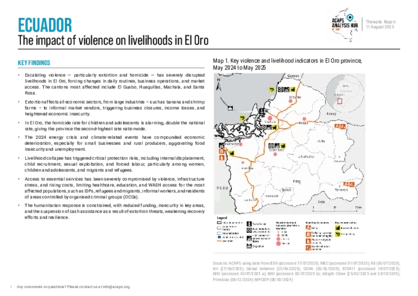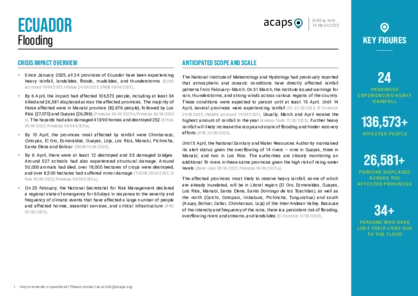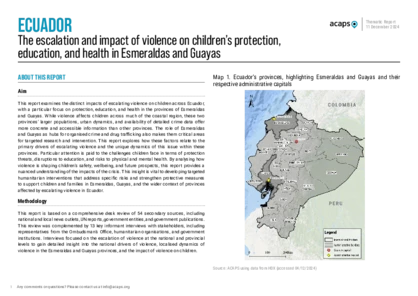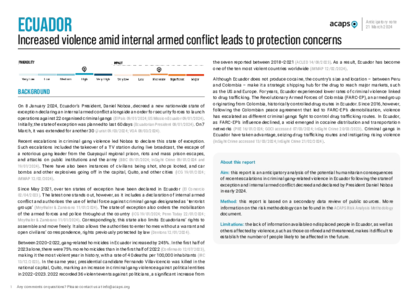Latest updates on country situation
04 March 2025
Since the start of February 2025, Ecuador has been experiencing severe flooding and landslides caused by persistent heavy rains. By 2 March, severe weather and flooding resulted in 11 deaths and nine injuries. Around 66,000 people have been affected, and over 2,000 have been displaced in 23 of the country’s 24 provinces. El Salvador, Esmeraldas, Guayas, Los Ríos, Manabí, Santa Elena, and Santo Domingo are among the hardest-hit provinces. Over 17,000 homes have been damaged and 40 completely destroyed. Healthcare infrastructure has also been damaged, further straining the capacity of health facilities. As a result, the National Secretariat for Risk Management declared a regional emergency on 25 February. In provinces such as El Oro and Esmeraldas, which have the highest protection risks, the floods compound the impact of criminal gang violence. The most urgent needs include WASH, shelter, healthcare, food, and protection. (ECHO accessed 04/03/2025, 3IS 18/12/2024, IFRC 01/03/2025)
04 April 2024
Heavy rainfall, floods, and landslides, worsened by El Niño seasonal events, have been causing widespread destruction in Ecuador since the beginning of 2024. As at 3 April, the impact has killed eight people, injured 13, and affected 170,000, primarily in the western provinces of Manabí and Guayas. It had also affected or destroyed more than 38,000 homes, 400 educational institutions, and 29 healthcare facilities nationwide. As a result, people require access to shelter, education, and healthcare services. (ERCC accessed 09/04/2024, SGR 03/04/2024, Ecuador Government accessed 09/04/2024)
current crises
in
Ecuador
These crises have been identified through the INFORM Severity Index, a tool for measuring and comparing the severity of humanitarian crises globally.
ECU004 - Floods
Last updated 31/01/2026
Drivers
Floods
Crisis level
Country
Severity level
2 Low
Access constraints
2.0
ECU001 - Multiple crises
Last updated 31/01/2026
Drivers
International Displacement
Conflict/ Violence
Floods
Crisis level
Country
Severity level
3.5 High
Access constraints
2.0
ECU003 - Conflict and Violence in Ecuador
Last updated 31/01/2026
Drivers
Conflict/ Violence
Crisis level
Country
Severity level
3.3 High
Access constraints
2.0
ECU002 - Displacement from Venezuela
Last updated 31/01/2026
Drivers
International Displacement
Crisis level
Country
Severity level
2.5 Medium
Access constraints
2.0
Analysis products
on
Ecuador
29 October 2025
Ecuador: escalation of violence in Nueva Prosperina, Guayaquil
DOCUMENT / PDF / 359 KB
In 2025, armed violence in the Nueva Prosperina district of Guayaquil escalated to critical levels, with the highest increase seen in the number of homicides. Between January–August 2025, 474 homicides were recorded, representing a 112% increase.
Attached resources
11 August 2025
Ecuador: the impact of violence on livelihoods in El Oro
DOCUMENT / PDF / 835 KB
This report aims to analyse the humanitarian effects triggered by violence-induced livelihood deterioration in El Oro, Ecuador, from May 2024 to May 2025.
Attached resources
11 December 2024
Ecuador: The escalation and impact of violence on children
DOCUMENT / PDF / 741 KB
This report examines the distinct impacts of escalating violence on children across Ecuador, with a particular focus on protection, education, and health in the provinces of Esmeraldas and Guayas.
Attached resources
21 March 2024
Ecuador: increased violence amid internal armed conflict leads to protection concerns
DOCUMENT / PDF / 1 MB
This is an anticipatory analysis of the potential humanitarian consequences of recent escalations in criminal gang-related violence in Ecuador following the state of exception and internal armed conflict decreed and declared by President Daniel Noboa in early 2024.






